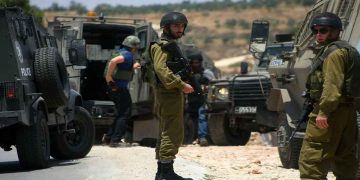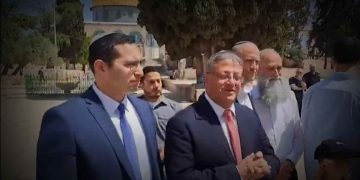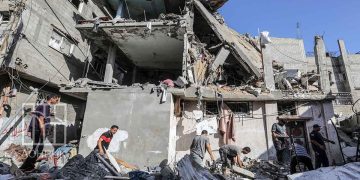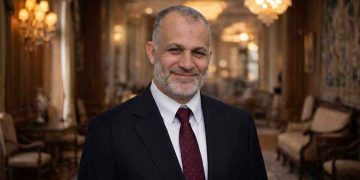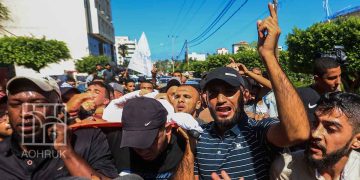On Monday 7 February, Arab Organisation for Human Rights in the UK (AOHR UK) held an online seminar, on the topic of the ‘the Displacement of Palestinians by the Israeli Occupation’, with a number of renowned scholars, activists, and advocates for the Palestinian people.
Amongst the event’s speakers were academics Dr. Ralph Wilde, an associate professor of UCL’s Faculty of Laws, Dr. Bilal Shobaki, who leads Hebron University’s Political Sciences Department, Dr. Shahd Abusalama, a Palestinian feminist writer and activist, Nicholas Squires, a former senior lecturer in Law and practicing solicitor,Mahmoud Salhiya, a resident of Sheikh Jarrah, whose family house was demolished last January, Dr. James Zogby, President of the Arab American Institute, Washington D.C., Aimee Shalan, Co-director of the Britain-based Makan, and Khaled Saffuri, President of the National Interest Foundation, based in Washington D.C.
Dr. Zogby began the seminar by sharing his analysis of changes of American attitudes towards the question of Palestine, explaining “that there’s a change of consciousness that is developing not only in the United States but globally and amongst decisive demographic groups – young people in particular, and people of colour.”
Zogby pointed out to the escalation of Israeli racism towards the Palestinians, saying that “Israel is working to establish entire Jewish-only areas in the occupied Palestinian territories.”
“There was a plan to seize strategic areas of land in order to constitute a Jewish control over the land of Palestine.”
“The idea of planting trees was not to beautify or make a green the area, but it was to erase the presence of Palestinians from those areas. The villages that were destroyed in the Nakba and in the aftermath of the Nakba were the areas that were planted as forests”, he added.
Dr. Ralph Wilde, in his survey of the international legal situation in regards Israel-Palestine, commented that “the international community has assumed that [Palestinian] self-determination can only be realised once there’s been a peace agreement; actually, according to international law, this is not correct. There is a legal basis for an immediate end to the occupation through applying the law on the use of force, which is the only basis on which Israel can maintain the occupation.”
“The international law should be enforced to indicate the right of the Palestinian people. If only the law was enforced, emancipation would be realised. The lack of Palestinian liberation is due to the violation of law with impunity”, he said.
He went on saying that “A lot of data lead to the conclusion, as I set out, that the occupation is illegal and constitutes an aggression, which is a crime in international law.”
Mahmoud Salhiya spoke movingly about his and family experience of the Israeli occupation forces continuing attempt to dispossess them – in his words, ‘cleanse’ them – and the wider Palestinian population from al-Quds.
Salhiya said that Israeli forces demolished his family house in a night raid without a court’s order, as he earlier submitted an appeal at the Supreme Court against the eviction order.
Salhiya pointed out that 15 members of his family are now homeless after his house demolition for allegedly building a school on its ruins. He added that dozens of others were forced to self-demolish their houses.
Dr. Bilal Shobaki explained how Israel’s historic policies in Jerusalem, have deliberately sought to divide those Palestinians living within the city from the surrounding populations, and more generally to reduce the Palestinian presence in the city, via home demolitions and the blocking of investment, amongst other practices.
Shobaki added that “Since the 2nd uprising, Israel succeeded to force tens of thousands of Palestinians out of occupied Jerusalem and to turn the city from a holy city into an industrial city.”
He also stressed the need to shed more light on “the plans that the Israeli governments promote each year to continue controlling the Palestinian territories and specifically Jerusalem.”
“After (the establishment of) apartheid wall, Israel succeeded to separate 140,000 of Palestinians outside the borders of Jerusalem, he added, stressing that “Israel has adopted a plan to convene the city of Jerusalem from a holy city to an industrial city.”
He further pointed out that “After 1967, Israel has established 15 settlements around Jerusalem, where it achieved two main goals. The first was to control a new territory around Jerusalem, and the second was to make a separation between the Palestinian community in Jerusalem and the Palestinian community around Jerusalem. In this case, the Palestinians in Jerusalem will lose the central position of this city.”
Aimee Shalaan focused on the recent pressures on various institutions, including schools, to adopt the anti-Palestinian IHRA definition of anti-Semitism.
IHRA definition of anti-Semitism, includes criticism of Israel and Zionism is being increasingly adopted across institutions in Britain and elsewhere, she said.
“Britain has not only stepped up its efforts on the international stage, adopting a highly regressive approach towards platforms in which Palestinians might have an opportunity to assert their rights, such as the Human Rights Council on the International Criminal Court, but also through its domestic policies and practises”, she said.
Shalaan added that “The support for Palestinian freedom, and the shrinking space for it, raise serious questions around freedom of expression and political expression that must be countered.”
She concluded by saying that “While it’s difficult not to feel demoralised by the approach of leading British politicians, we should acknowledge that it’s also a sign of the success of the Palestinian rights struggle. We are in a new global moment where the decades old framing a new side one state two sides state and peace process is being unpicked, and where more and more people and human rights organisations are using the language of apartheid and colonialism to describe Israel’s oppression Palestinians.”
Dr. Shahd Abusalama, who was recently suspended from her academic post at Sheffield Hallam University, only to be reinstated shortly after. After explaining her case to the seminar’s audience, Dr. Abusalama said “our grievances are legitimate; what we are calling for are very basic rights: we want freedom, justice, equality, and return to our lands.”
She pointed out that the Israelis “are very good at manipulating and twisting truths. But we have a very just cause, and our grievances are legitimate and what we are calling for a very basic rights: we want freedom, justice, equality and return to our lands.”
Abu Salama further underlined that the so-called “Israeli lobbying groups” has pressed to fire her from her job at Sheffield Hallam University in the United Kingdom, before the university reconsidered its decision and allowed her to return again.
She concluded saying: “If people are anti-racist, they have to support Palestinian aspirations for freedom, justice, and equality. They have to support as well our resistance to achieve those aspirations and join us as allies in our struggle to achieve those demands.”
Our final speaker, Khaled Saffuri, explained that whilst the American mainstream media’s representations of the Palestinian issue were still sorely lacking, coverage of both the 2021 war against Gaza and of the changing positions of various international human rights groups, are part of the positive trend.
He added that “the fact that the amnesty report that Israel is an apartheid state was not published in any newspaper, gives an example how the media in the US covers the Palestinian issue… Palestinians get killed all the time, but they never get covered in the US media. When an Israeli settler gets killed or even wounded the media, they cover it.”
“Things are changing very slowly, but I am optimistic. Social media covered amnesty report heavily,” he said.

